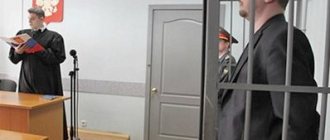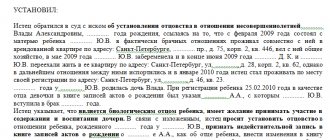The Supreme Court overturned the conviction of a farmer accused of fraud
As RG wrote, in the spring of 2021 Kardanova was accused of fraud in obtaining subsidies for the creation of the farm “Trap for Juliet”, “RG” dated 11/04/2019 and “Stubborn Juliet”, “RG” dated 03/11/2020 .) This story, which clearly illustrates the confusion with the provision of budget assistance to farmers in Kabardino-Balkaria, caused a great public outcry in the republic. The young woman, a candidate of sciences, spent more than two years under trial and investigation. She received a grant under the Beginning Farmer program back in 2021. By this time she had a small farm in the village of Nartan. She and her brothers have been caring for animals since childhood. Having matured, she received two higher educations, defended her Ph.D. thesis, taught at a university, while continuing to engage in rural work.
Kardanova had a small farm with eight cows. A grant was needed to expand it and purchase livestock. With the allocated one million 106 thousand rubles, she bought 15 heads of cattle and began expanding the farm. In accordance with the requirements of the program, I hired two people, regularly paid them salaries, and paid taxes. Therefore, the call to the regional police department in the spring of 2018 came as a complete surprise to her. She was accused of deliberately concealing the fact that she was teaching at a university and also providing an allegedly forged certificate of no tax arrears. Juliet was taken aback, because she did not hide anything from anyone and did not engage in forgeries. However, the police investigator set the case in motion, conveying through an intermediary that he was ready to close it... for a million rubles. Kardanova immediately informed the prosecutor's office about the extortion. After this, the police investigator hastily resigned, but the case of the obstinate farmer was brought to trial by his colleagues.
The hearings, chaired by Galina Pshukova, lasted in the Chegemsky District Court for more than a year. Kardanova was charged under the article of fraud on an especially large scale (part 4 of Article 159 of the Criminal Code of the Russian Federation), the sanctions of which provide for up to ten years in prison. However, during the process, the supervisory agency radically changed its position. Speaking during the debate, the prosecutor said that there were no signs of fraud in her actions, since both the cattle and the farm were available. But for some reason the charge of forgery of documents against Kardanova was not dropped. As a result, she was sentenced to a fine of 40 thousand rubles, from which she was immediately released due to the expiration of the statute of limitations for the offense. According to the farmer, “the court simply covered up the obvious flaws of the investigation with a cloak.” Juliet stated that she did not intend to agree with this and would seek her full acquittal. The Commissioner for the Protection of the Rights of Farmers and Small Businesses in the Republic, Zhantemir Gubachikov, also demanded that the criminal prosecution of Kardanova be stopped.
On May 22, her appeal against the decision of the Chegemsky District Court was considered by the criminal panel of the Supreme Court of Kabardino-Balkaria. “I ask the verdict... to be canceled as unmotivated, unfounded and illegal,” Juliet Kardanova asked in it. According to her lawyer Irina Monastyrlova, the court of first instance unreasonably reclassified the charge from Part 4 of Article 159 (fraud) to Part 3 of Article 327 of the Criminal Code of the Russian Federation (forgery of documents), without describing the reasons for the change in qualification. “The court in its verdict excluded the qualification of actions under Part 4 of Article 159 of the Criminal Code, which could have resulted in an acquittal, but she was found guilty of forgery of documents, although charges under this article were not brought either at the stage of the preliminary investigation or in the indictment . As a representative of the supervisory agency stated, in the court of first instance not only procedural errors were made, but Kardanova’s constitutional rights were also violated. As a result, the Supreme Court overturned the decision of the Chegem District Court and sent the case for a new trial to the same court, but with a different composition.
Juliet hopes that now she will finally be completely justified.
Judicial practice: acquittals, reversals, changes, terminations under Art. 159 CC 2019-2021
Complete termination of the criminal case (acquittal) under Part 5 of Art. 159 of the Criminal Code of the Russian Federation in the court of cassation (the verdict was not even appealed on appeal!). Grounds: the objective side of the crime has not been established, the ORM data are not relevant to the subject of proof; expert opinions have been replaced by testimony, which is unacceptable; The conviction is based on the following assumptions:
By the verdict of the Industrial District Court of Stavropol dated March 25, 2019, T. was sentenced under Part 5 of Article 159 of the Criminal Code of the Russian Federation to 3 years of imprisonment using Article 73 of the Criminal Code of the Russian Federation, suspended with a probationary period of 3 years, with the assignment of duties in accordance with Part .5 Article 73 of the Criminal Code of the Russian Federation.
The case was not considered on appeal.
T. was found guilty of working in the wholesale trade of petroleum products, knowing about the similarity in appearance of heating oil and diesel fuel, knowing that heating oil in its performance does not meet the requirements of technical regulations, GOST technical conditions and cannot be used for automobile piston engines, but is lower in price than diesel fuel, decided to take possession of M’s funds by deception. Carrying out his plan, T. invited M. to purchase diesel fuel from him in the amount of 32.934 tons in the amount of 1,130,236.2 rubles, but under the guise of diesel fuel intentionally sold heating oil, receiving money from the victim.
In accordance with the requirements of Article 307 of the Code of Criminal Procedure of the Russian Federation, the descriptive and motivational part of the guilty verdict must contain a description of the criminal act recognized by the court as proven and the evidence on which the court’s conclusions regarding the defendant are based.
However, as evidence that T. sold heating oil to M., only the testimony of the victim, the testimony of witnesses M.S. at the confrontation are given. and Ts., which they did not confirm at the court hearing, as well as data from operational search activities carried out on October 4, 2021.
To establish the type of fuel sold to M., special knowledge was required, namely, the conclusion of an appropriate technical examination. This examination was not carried out; M. destroyed the fuel purchased from T. before it was examined by the investigative authorities.
As evidence, the court pointed to the results of a test purchase carried out by FSB officers with the participation of M. on October 4, 2016. However, the case materials do not contain evidence that the purchase was made of exactly the fuel that was sold to M. from September 7 to September 13, 2021. Sale of low-quality fuel to M. October 4, 2021 T. is not incriminated. Under such circumstances, the data obtained as a result of operational-search activities are not included in the subject of proof in a criminal case by virtue of Article 252 of the Code of Criminal Procedure of the Russian Federation.
Thus, the court did not establish the objective side of the crime. It is impossible to establish the type of fuel sold to M. at the present time due to its destruction; the case materials do not contain other admissible evidence of T.’s commission of a crime. The testimony of M. and witnesses in this part without expert research is not enough.
Under such circumstances, the court verdict was overturned, and the criminal case was terminated on the basis of clause 2, part 1, article 24 of the Code of Criminal Procedure of the Russian Federation for lack of corpus delicti, recognizing T.’s right to rehabilitation.
Cassation ruling of the Fifth Court of Cassation of General Jurisdiction No. 77-844/2020
Mitigation of the sentence under Art.
159 of the Criminal Code of the Russian Federation in the cassation instance with requalification from Part 4 of Art.
159 of the Criminal Code of the Russian Federation at Part 3 of Art. 159 of the Criminal Code of the Russian Federation, part 2 of Art. 159 of the Criminal Code of the Russian Federation, as well as part 1 of Article 159 of the Criminal Code of the Russian Federation. Grounds: the particularly large amount of theft was recognized as unfounded, because what was done constitutes a set of crimes, and not a continued theft. According to the verdict * of the district court of the city * dated December 7, 2021, upheld by the appeal ruling * of the regional court dated February 10, 2021, K. was found guilty of fraud, that is, of stealing someone else’s property by deception, committed on a particularly large scale size.
From the description of the criminal act contained in the verdict, it follows that K., in the period from the spring of 2008 to November 25, 2014, acting deliberately, for selfish reasons, with the aim of stealing someone else’s property by deception, under the pretext of providing services for the acquisition in Germany and delivery of foreign-made vehicles to the territory of the Russian Federation, without intending to fulfill his obligations, received money from the victims, which he subsequently stole.
These actions of the convicted K. were qualified by the court under Part 4 of Art. 159 of the Criminal Code of the Russian Federation as a single ongoing crime.
Meanwhile, while qualifying the actions of the convict as fraud, that is, the theft of someone else's property by deception on an especially large scale for a total amount of 10,456,131 rubles 47 kopecks, the court did not take into account that K. committed the theft of funds from 20 victims over a long period of time since 2008 . to 2014, while none of the victims suffered damage on a particularly large scale.
In accordance with the explanations given in paragraph 16 of the resolution of the Plenum of the Supreme Court of the Russian Federation of December 27, 2002 No. 29 “On judicial practice in cases of theft, robbery and robbery”, continued theft, consisting of a number of identical criminal offenses, should be distinguished from a set of crimes actions committed by taking someone else's property from the same source, united by a single intent and constituting a single crime.
According to the factual circumstances established by the court, K. did not mislead an unlimited number of people, but in each specific case, deceiving the victim, received from him the funds that he stole, and disposed of the stolen funds, after which he committed the theft of funds from another victim in the same way.
The method of deception—the provision of services for the purchase of a vehicle in Germany—cannot indicate K.’s intent to commit a single ongoing crime against 20 victims.
According to the meaning of the law, if a person has not committed a continuing crime, but several different thefts, it is unacceptable to determine its size based on the total value of the stolen property.
The Judicial Collegium for Criminal Cases of the First Cassation Court of General Jurisdiction changed the court decisions made in the case: it reclassified K.’s actions from Part 4 of Art. 159 of the Criminal Code of the Russian Federation at Part 3 of Art. 159 of the Criminal Code of the Russian Federation, part 2 of Art. 159 of the Criminal Code of the Russian Federation, as well as part 1 of Article 159 of the Criminal Code of the Russian Federation (under which K. was released from punishment due to the expiration of the statute of limitations for criminal prosecution), with the appointment of an appropriate punishment for each crime, as well as in their totality, a more lenient one compared to the previously imposed punishment.
(Generalization of the cassation practice of the judicial panel on criminal cases of the First Cassation Court of General Jurisdiction for the first quarter of 2021 (typical mistakes made by the courts included in the cassation district))
Complete termination of the criminal case under Part 1 of Art. 159 of the Criminal Code of the Russian Federation in the court of cassation. Grounds: intent to steal has not been proven.
According to the verdict of the magistrate of the judicial district * judicial district * region dated October 25, 2021, upheld by the appeal decision of the * district court * region dated December 11, 2021, K. was found guilty of fraud, that is, theft of someone else’s property by breach of trust .
However, when deciding to convict K. under Part 1 of Art. 159 of the Criminal Code of the Russian Federation, the magistrate did not take into account that the subjective side of the crime provided for in Part 1 of Art. 159 of the Criminal Code of the Russian Federation, is characterized by the presence of direct intent to steal.
As the Plenum of the Supreme Court of the Russian Federation explained in paragraph 4 of the resolution of November 30, 2021 No. 48 “On judicial practice in cases of fraud, misappropriation and embezzlement”, the presence of such intent can be evidenced, in particular, by the person’s deliberate lack of real opportunity to fulfill obligation in accordance with the terms of the contract, the use by a person of forged documents when concluding a contract, including identification documents, statutory documents, letters of guarantee, certificates, concealment by a person of information about the existence of debts and pledges of property, disposal of received property for personal purposes contrary to the terms of the contract and others. Courts should take into account that these circumstances in themselves cannot prejudge the court’s conclusions about a person’s guilt in committing fraud. In each specific case, it is necessary, taking into account all the circumstances of the case, to establish that the person obviously did not intend to fulfill his obligations.
From the materials of the criminal case, it is clear that K., throughout the entire proceedings in the case, consistently asserted that he had no intention to steal the bank’s funds received in the form of a consumer loan, due to his earnings and property, the value of which exceeds the amount of the loan, however, this argument of the convicted person was rejected by the magistrate.
Justifying K.'s intent to steal funds from JSC Bank, the magistrate in the verdict referred to the fact that from the moment of concluding the loan agreement and after using the loan funds, the convict had no real opportunity to fulfill his obligations to the bank, he had no intention this should be done before a procedural check was initiated against him by law enforcement officers at the request of the victim, and the repayment of credit debt after the initiation of a criminal case was forced to compensate for the damage caused by the crime.
In support of the conclusion about K.’s guilt, the magistrate in the verdict referred to the testimony of the victim’s representative, witnesses and case materials, which testify only to the convict’s conclusion of a loan agreement, his financial situation and personal information.
At the same time, the magistrate and the court of appeal did not take into account that, according to the individual terms of the consumer loan agreement concluded on November 3, 2021 between K. and JSC Bank, the validity period of this agreement and the loan repayment period were determined “On demand”, at the time conclusion of the agreement, the convicted person worked, had an income and a car, the cost of which significantly exceeded the loan amount.
From the case materials it follows that in order to conclude an agreement to receive a loan, K. was presented with a passport and reliable information about the place of registration and work, JSC "Bank" did not directly contact K. with a demand for repayment of the loan, and after the victim applied to the department the police, as the convict became aware of, K. fulfilled his obligations under the contract in full, reimbursed the loan received with all additional payments, and therefore the bank has no claims against him.
Under such circumstances, the judicial panel for criminal cases of the First Cassation Court of General Jurisdiction overturned the court decisions and terminated the criminal case against K. on the basis of clause 2 of part 1 of Art. 24 of the Code of Criminal Procedure of the Russian Federation for the absence in his actions of the corpus delicti provided for in Part 1 of Art. 159 of the Criminal Code of the Russian Federation, recognizing on the basis of Art. 133 of the Code of Criminal Procedure of the Russian Federation for K.’s right to rehabilitation.
(Generalization of the cassation practice of the judicial panel on criminal cases of the First Cassation Court of General Jurisdiction for the first quarter of 2021 (typical mistakes made by the courts included in the cassation district))
Mitigation of the sentence under Art. 159 of the Criminal Code of the Russian Federation in the court of cassation. Reasons: if a citizen has suffered a large or especially large amount of damage, then the additional qualification of the act - “causing significant damage” - is unnecessary.
By the verdict of the Kansk City Court of the Krasnoyarsk Territory dated April 9, 2021, K. was convicted under Part 2 of Art. 159 of the Criminal Code of the Russian Federation (two crimes), part 3 of Art. 159 of the Criminal Code of the Russian Federation (four crimes), part 4 of Art. 159 of the Criminal Code of the Russian Federation on the basis of Part 3 of Art. 69 of the Criminal Code of the Russian Federation to 5 years in prison.
By the appeal ruling of the judicial panel for criminal cases of the Krasnoyarsk Regional Court dated June 27, 2021, the sentence was left unchanged.
Having checked the case materials on the cassation appeal of the convicted person, the judicial panel for criminal cases of the Eighth Court of Cassation of General Jurisdiction changed the decisions of the lower courts on the following grounds.
It follows from the verdict that K.’s actions were qualified by the court as fraud causing significant damage, and also in four cases on a large scale, and in one case on an especially large scale.
At the same time, the court did not take into account that the above-mentioned qualifying criteria relate to the same circumstance that must be proven in a criminal case, namely the amount of damage caused by the crime, and the qualification of a person’s actions on the basis of causing significant damage to a citizen when committing theft of someone else’s property on a large scale and especially large sizes is redundant.
The appellate court did not eliminate the violation of the law.
Under the above circumstances, from K.’s conviction under Part 3 of Art. 159 of the Criminal Code of the Russian Federation (four crimes), as well as under Part 4 of Art. 159 of the Criminal Code of the Russian Federation excludes the qualifying feature “causing significant damage to a citizen.”
Determination of the judicial panel for criminal cases of the Eighth Court of Cassation of General Jurisdiction No. 77-223/2020
Mitigation of the sentence under Part 3 of Art.
159 of the Criminal Code of the Russian Federation in the court of cassation. Grounds: reclassification of the offense from Part 3 of Art. 159 of the Criminal Code of the Russian Federation on Part 1 of Art. 159.4 of the Criminal Code of the Russian Federation, because
according to Art. 9 of the Criminal Code of the Russian Federation, - the criminality and punishability of an act are determined by the criminal law that was in force at the time it was committed: By the verdict of the Zheleznogorsk City Court of the Kursk Region dated June 24, 2021, B. was found guilty of committing crimes under Part 3 of Art. 159 of the Criminal Code of the Russian Federation (three crimes).
According to the meaning of the law, crimes provided for in Art. 159 of the Criminal Code of the Russian Federation should be considered committed in the field of entrepreneurial activity if they are committed by persons engaged in entrepreneurial activity or participating in entrepreneurial activity, and these crimes are directly related to this activity. Fraud committed in the field of business activity includes actions related to deliberate failure to fulfill contractual obligations.
Intentional failure to fulfill a contractual obligation means that a person acting as a representative of an organization or an entrepreneur, or the entrepreneur himself, does not initially intend to fulfill the obligation to return the property, expecting to illegally take possession of it, knowing that thereby causing damage to the owner or other possessor of the property.
As follows from the charges brought against B. and the circumstances of the crimes described in the verdict, the activities of the convict, who was the founder and director of V* LLC, were entrepreneurial. The main activity of the Company was the provision of tourism services. That is, B.’s actions related to fraud, committed before the entry into force of Federal Law No. 325-FZ of July 3, 2021, taking into account the amount of stolen property, in relation to victims S. and P. contain signs of crimes under Part 1 Art. 159.4 of the Criminal Code of the Russian Federation (as amended by the Federal Law of November 29, 2012 No. 207-FZ) - fraud associated with deliberate failure to fulfill contractual obligations in the field of business activity, and in relation to the victim A. - signs of a crime under Part 2 of Art. 159.4 of the Criminal Code of the Russian Federation (as amended by Federal Law No. 207-FZ of November 29, 2012) - fraud associated with deliberate failure to fulfill contractual obligations in the field of business activity on a large scale.
In accordance with Federal Law of July 3, 2021 No. 325-FZ Art. 159.4 of the Criminal Code of the Russian Federation has lost force, but is subject to application to B. due to the requirements of Art. 9 of the Criminal Code of the Russian Federation, according to which the criminality and punishability of an act are determined by the criminal law in force at the time the crime was committed.
The panel of judges changed the verdict and reclassified B.’s actions from Part 3 of Art. 159 of the Criminal Code of the Russian Federation on Part 1 of Art. 159.4 of the Criminal Code of the Russian Federation (as amended by the Federal Law of November 29, 2012 No. 207-FZ) (for three crimes), for which it imposed punishment in the form of a fine to the state, on the basis of paragraph “a” of Part 1 of Art. 78 of the Criminal Code of the Russian Federation and Part 8 of Art. 302 of the Code of Criminal Procedure of the Russian Federation exempted B. from punishment due to the expiration of the statute of limitations for criminal prosecution; excluded the reference to the appointment of punishment for B. according to Part. 3 and 5 tbsp. 69 of the Criminal Code of the Russian Federation; excluded the indication of crediting the sentence served by the sentence of the Zheleznogorsk City Court of the Kursk Region dated June 24, 2021 to the sentence served by the sentence of the Zheleznogorsk City Court of the Kursk Region dated June 18, 2021.
Determination of the First Cassation Court of General Jurisdiction No. 77-426/2020 of April 23, 2021)
Complete termination of the criminal case under Part 3 of Art. 159.2 of the Criminal Code of the Russian Federation (3 episodes) in the court of cassation. Reasons: exclusion of the qualifying feature “using official position”, because convicted official in relation to other
organizations did not have any organizational-administrative and administrative-economic powers. The actions of the convicted person were reclassified for each crime under Part 1 of Article 159.2 of the Criminal Code of the Russian Federation, and with the expiration of the statute of limitations for criminal prosecution, the criminal case was terminated.
By the verdict of the Leninsky District Court of the city of Saransk of the Republic of Mordovia dated April 4, 2021 (taking into account the appeal ruling of the Supreme Court of the Republic of Mordovia dated July 22, 2021), K. was found guilty of committing fraudulent acts in receiving payments using her official position.
As follows from the materials of the criminal case, K. stole funds allocated from the federal budget of the Russian Federation and belonging to the Federal State Budgetary Educational Institution of Higher Education “MSU named after. N.P. Ogareva" funds intended for payment of state social scholarships to students: in the periods from September 16, 2014 to August 31, 2015 in the amount of 25,038 rubles, and in the period from September 18, 2015 to September 14, 2016 - in the amount of 65,067 rubles, first by submitting to the State Public Institution “Social Protection of the Population in the Ichalkovsky District of the Republic of Mordovia” the fake certificates she produced with understated data on the level of her salary, and then transferring the certificates she received to K. (son) stating that that their family belongs to the preferential category of low-income families entitled to receive state social assistance, after which her son, by the administration of the Federal State Budgetary Educational Institution of Higher Education "MSU named after. N.P. Ogareva" was assigned a social scholarship, which he received in the specified amounts during 2014-2016.
The court of first instance convicted K. of committing two crimes under Part 3 of Art. 159.2 of the Criminal Code of the Russian Federation, using his official position. At the same time, her official powers, which consist, in particular, in monitoring the execution of village administration documents, issuing written certificates, signing certain types of documents, access to the administration seal and corner stamp, organizing and implementing information on the composition and content of administration documents, facilitated she only has the possibility of producing fake salary certificates.
Whereas when submitting these certificates to the State Institution “Social Protection of the Population in the Ichalkovsky District of the Republic of Mordovia”, as well as
when submitting certificates received from social protection authorities to the Federal State Budgetary Educational Institution of Higher Education “MSU named after N.P.
Ogarev”, as well as in the appointment of a scholarship and receipt of this scholarship by K.’s son, K.’s official powers were not used, since in relation to these organizations she did not have any organizational, administrative and administrative powers. Due to the incorrect application of the criminal law in the legal assessment of the actions of the convicted person, the judicial panel changed the court decisions, excluded the qualifying feature “using official position”, reclassified K.’s actions for each crime under Part 1 of Article 159.2 of the Criminal Code of the Russian Federation and due to the expiration statute of limitations for criminal prosecution, terminated the criminal case for each crime on the basis of paragraph 3 of Part 1 of Art. 24 Code of Criminal Procedure of the Russian Federation.
(Determination of the First Cassation Court of General Jurisdiction No. 77-467/2020 of April 23, 2021)
The review of judicial practice was prepared by V.V. Panfilov.
Reproduction is permitted only with reference to the source.







